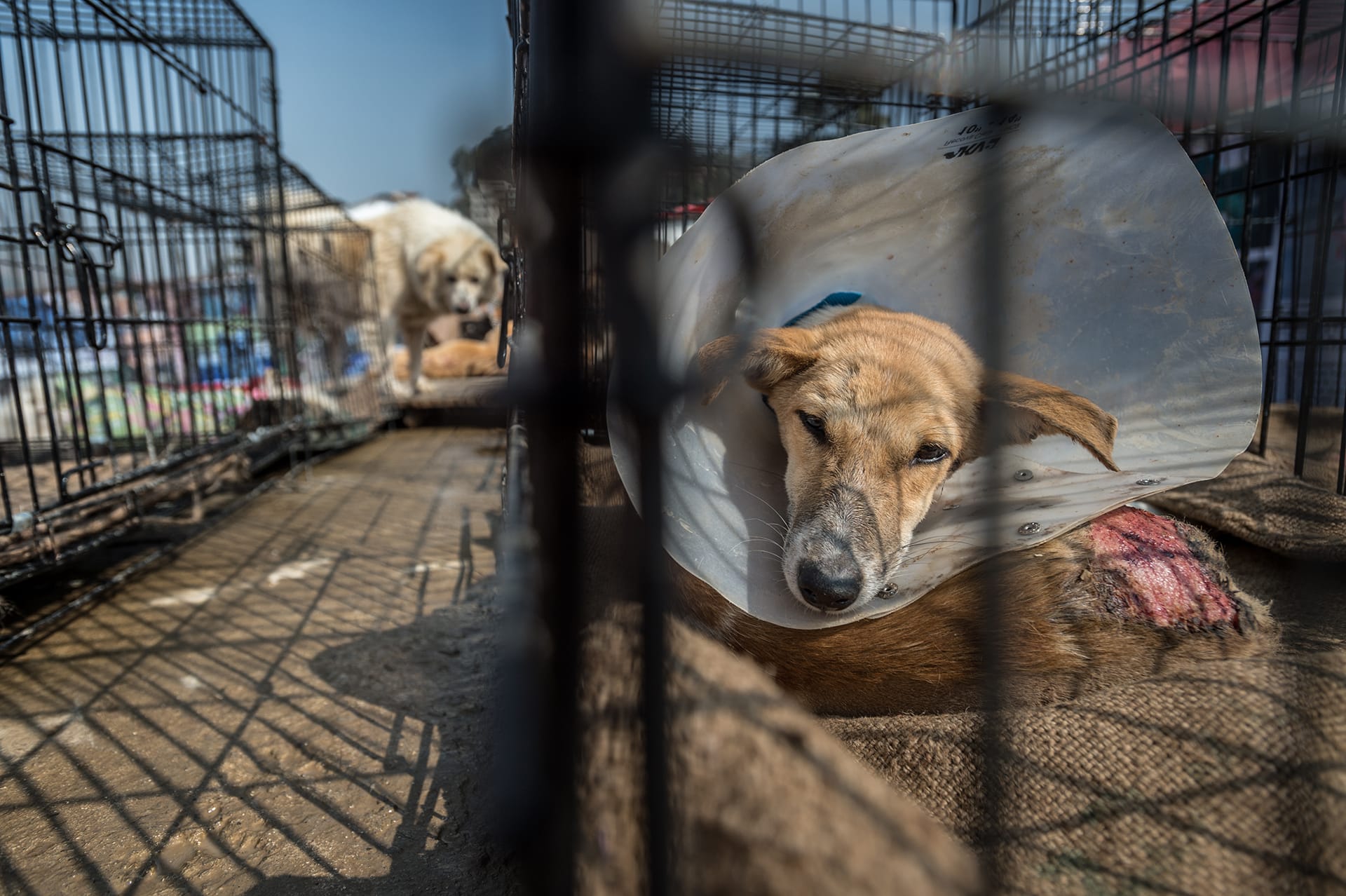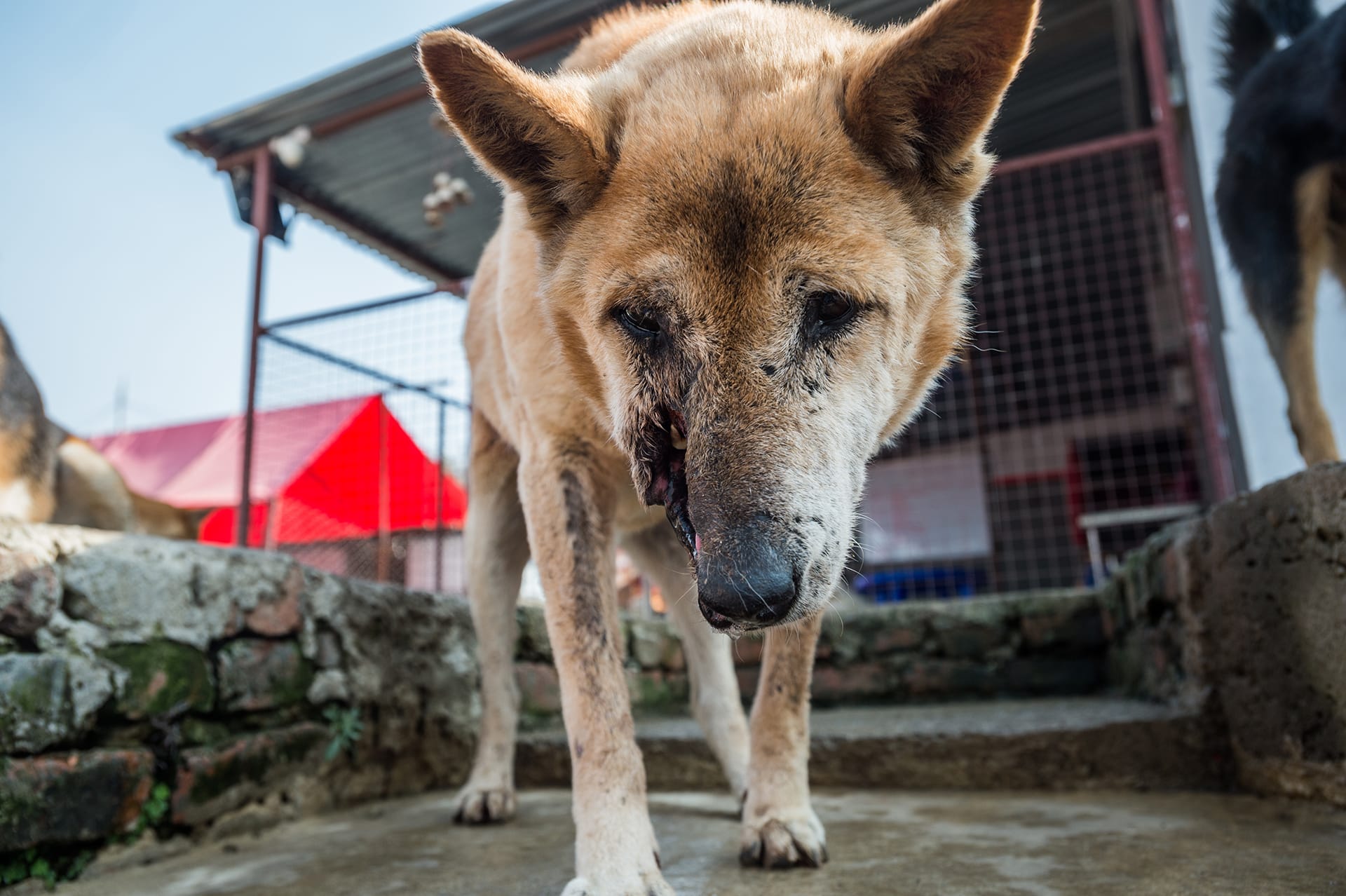Sneha Shrestha
Founder of Sneha's Care, a shelter for street dogs in Nepal
Photos by Jo-Anne McArthur.
Interview and story by Sayara Thurston.
“I wasn’t an animal lover. I wasn’t even a dog lover.”
Photo: A rescue dog naps in the sun at Sneha’s Care.
She tells me this as we’re surrounded by more than a hundred dogs at Sneha’s Care, the shelter that Shrestha runs outside of Kathmandu in Nepal. More than a dozen of the animals are paralyzed from the waist down and many of them are recovering from horrendous injuries — missing legs and ears and eyes and parts of their snouts — but all running, barking, playing joyfully in a space where they know they are safe and loved.
Four years ago, after much pestering from her husband, Shrestha finally agreed to get a puppy. Two puppies, actually, though Shrestha insisted that they be bought from a breeder — she didn’t want street dogs in her home.
Photo: Rescue dogs getting some afternoon sun at Sneha’s Care.
She was like a child.”
Zara would wait at the gate for Shrestha and her husband to come home from work every day. Shrestha started getting up earlier to walk the dogs and spend time with them. But one day, Zara wasn’t at the gate at the end of the day. Shrestha found her inside, vomiting blood.
She’d been poisoned by a neighbour who didn’t like her barking. And despite desperate efforts to save her, she died four days later. Shrestha was devastated. “In Hindu culture, when a family member dies, we don’t eat anything for 13 days. I did this for my dog.”
Knowing how Zara had suffered — and how unjustly — Shrestha began to see street dogs differently. She started feeding them, carrying dog biscuits with her wherever she went. She started noticing how many of them had injuries and desperately needed vet care.
Photo: A volunteer and a rescue dog at Sneha’s Care in Nepal.
Photo: Sneha Shrestha and some of the dogs she cares for at her shelter.
She began paying for space at a local kennel to give dogs shelter, care, and regular meals. Within a month, the kennel was full. But Shrestha wasn’t satisfied and she didn’t like that she wasn’t in charge of how the kennel was run. So, with the support of her husband, she sold a house she owned and opened a shelter.
Video Top: Laundry drying at the shelter, which sits just outside of Kathmandu.
Video Bottom: A rescue dog gets some love at Sneha’s Care.
Main Photo: A rescue dog in his crate at Sneha’s Care.
Today, Sneha’s Care has a new shelter facility, a team of veterinarians and technicians, and welcomes volunteers from around the world who come to spend time helping the dogs recover and find new homes (although some live permanently at the shelter).
Photo: A rescue dog with a scarred face at Sneha’s Care.
As we talk, Shrestha looks out at the paralyzed dogs — most of them were injured in hit and run cases. People ask her why she doesn’t euthanize them. “My father was paralyzed for 17 years. We never thought about euthanizing him,” she says poignantly. She says the only difference between him and the dogs is that “my father could speak. And he explained to me that he wanted to live. Maybe these dogs also want to live. I don’t have the right to euthanize them.”
Photo: A disabled rescue dog gets some exercise outside Sneha’s Care.
Shrestha can’t buy dog wheelchairs in Nepal but she imports them. She laughs,
“when I put the paralyzed dogs in the wheelchairs, they run faster than the four-legged dogs!”
After she opened the shelter and realized how much love she had for dogs suffering on the streets of Kathmandu, Shrestha suddenly saw all animals in a new light. She realized that she was calling herself an animal lover, but in practice, she was only showing that love to dogs. So she became vegan.
Photo: Volunteers help all the dogs get exercise outside Sneha’s Care in Nepal.
Today, Shrestha is one of Nepal’s most vocal and visible animal advocates. “I want to be a voice for the voiceless,” she says. Shrestha recently successfully campaigned for the Nepalese government to adopt the country’s first animal protection law, as well as new standards covering buffaloes in transport, who suffer in horrendous conditions on the journey from the India-Nepal border.
I learned humanity from these animals.”
She was nominated as Youth Icon Of The Year 2018 by Women With Vision’s 100 Most Influential Women Of Nepal. Most of her volunteers and supporters are women. “Women are full of love. They have so many passions, helping people, helping animals. Women can save the world.”
Are things changing? Absolutely, she says. “Nepal is changing, society is changing.”
Photo: Photo: Staff, volunteers, and visitors spend time with the rescue dogs at Sneha’s Care.
Shrestha believes that educating young people about protecting animals is paramount. “I was never taught in school to be kind,” she says, but now she sees local children visiting the shelter and donating their pocket money.
And it’s not just us who can teach compassion. “The most important thing is to have humanity. It’s not only people who teach you humanity, I learned humanity from these animals. These animals taught me everything.”
Zara’s memory keeps her motivated. “Zara inspired me to build this shelter. I have her photo beside my bed. I see her every day and she motivates me to help animals.”
“She is the reason I have this shelter.”
The animal protection movement in Nepal has many challenges in front of it, but Zara’s legacy is that Shrestha will always be there to face them.
Learn more and support Sneha’s Care.
Photos and video by Jo-Anne McArthur. Interview and story by Sayara Thurston.




















